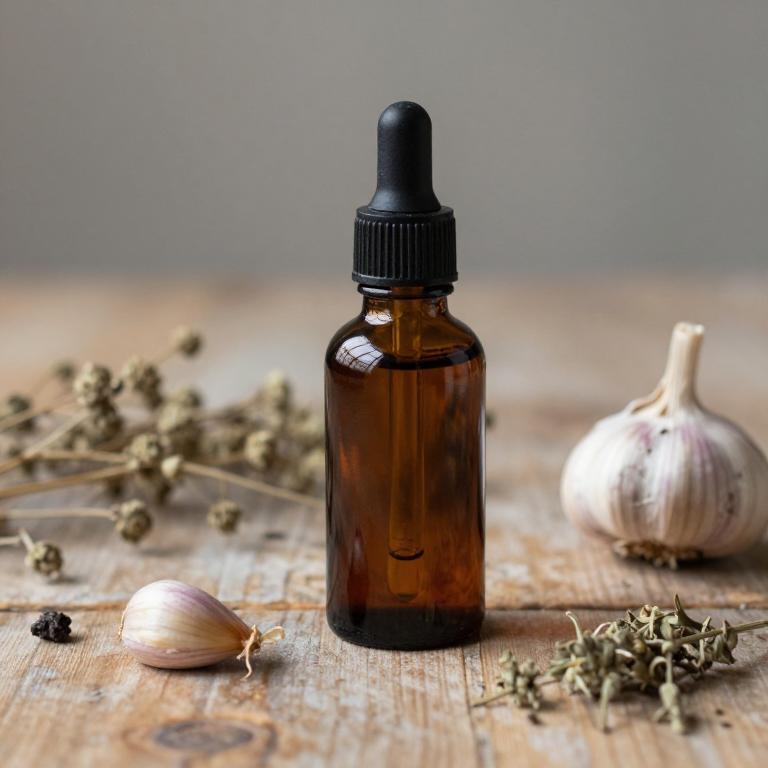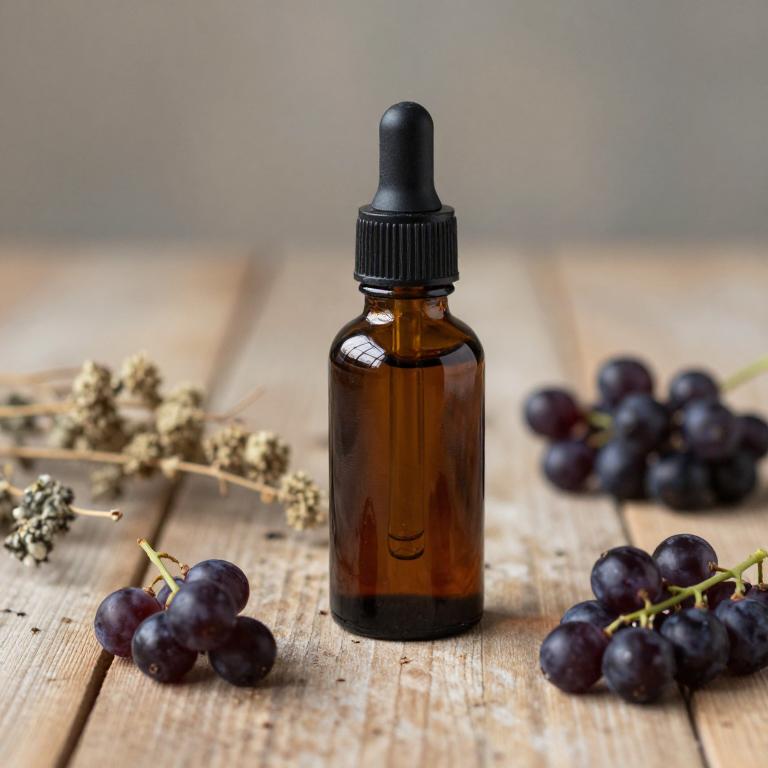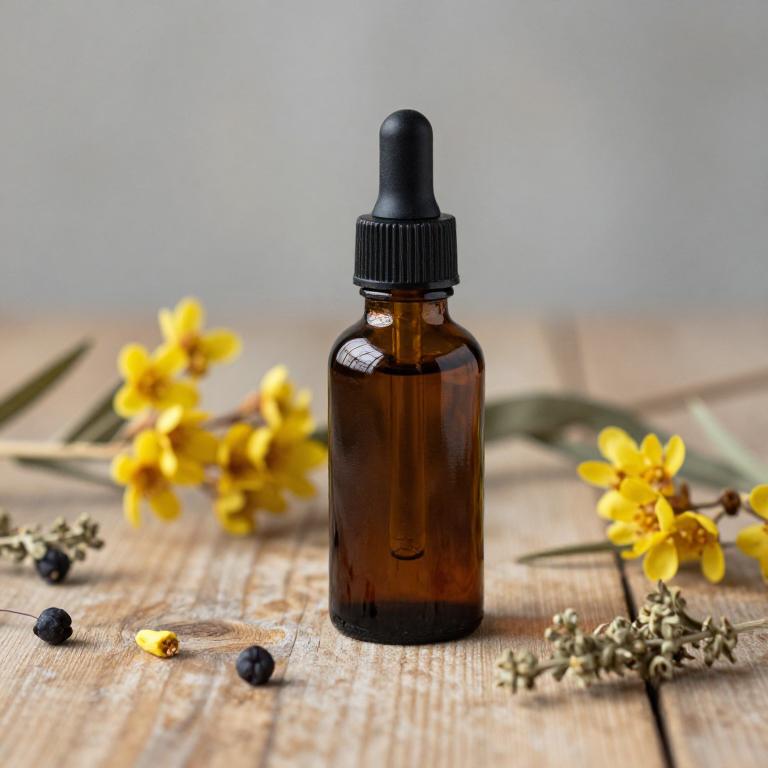10 Best Herbal Tinctures For High Cholesterol

Herbal tinctures have gained popularity as natural alternatives for managing high cholesterol, offering a blend of traditional wisdom and modern herbal science.
These concentrated liquid extracts are typically made by soaking herbs in alcohol or glycerin, allowing the active compounds to be readily absorbed by the body. Common herbs used in cholesterol-lowering tinctures include garlic, ginger, hawthorn, and milk thistle, each known for its potential to support cardiovascular health. While herbal tinctures may help reduce LDL cholesterol and improve lipid profiles, they should not replace medical advice or prescribed treatments without consulting a healthcare professional.
It is important to ensure the quality and purity of herbal products, as their effectiveness can vary based on formulation and individual health conditions.
Table of Contents
- 1. Garlic (Allium sativum)
- 2. Common grape (Vitis vinifera)
- 3. Thistle (Silybum marianum)
- 4. Stinging nettle (Urtica dioica)
- 5. Salvia (Salvia officinalis)
- 6. Ginger (Zingiber officinale)
- 7. Gurmar (Gymnema sylvestre)
- 8. Dog rose (Rosa canina)
- 9. Blessed thistle (Cnicus benedictus)
- 10. Sea buckthorn (Hippophae rhamnoides)
1. Garlic (Allium sativum)

Allium sativum, commonly known as garlic, has been traditionally used for its potential health benefits, including its role in managing high cholesterol.
Herbal tinctures made from fresh or dried garlic cloves are often prepared using alcohol as a solvent to extract the active compounds, such as allicin, which are believed to contribute to cardiovascular health. These tinctures may help lower low-density lipoprotein (LDL) cholesterol, often referred to as "bad" cholesterol, by improving lipid metabolism and reducing oxidative stress. However, while some studies suggest garlic tinctures may have a modest effect on cholesterol levels, more research is needed to confirm their efficacy and safety.
It is important to consult a healthcare provider before using garlic tinctures, especially for individuals on cholesterol-lowering medications, to avoid potential interactions.
2. Common grape (Vitis vinifera)

Vitis vinifera, commonly known as the grape vine, has been traditionally used in herbal medicine for its potential cardiovascular benefits.
Herbal tinctures derived from Vitis vinifera are often used to support heart health, particularly in managing high cholesterol levels. These tinctures are believed to contain compounds such as resveratrol, which may help reduce low-density lipoprotein (LDL) cholesterol and increase high-density lipoprotein (HDL) cholesterol. While some studies suggest that Vitis vinifera extracts may have a positive impact on lipid profiles, more clinical research is needed to confirm their efficacy and safety.
As with any herbal supplement, it is important to consult with a healthcare provider before use, especially for individuals with existing health conditions or those taking medications.
3. Thistle (Silybum marianum)

Silybum marianum, commonly known as milk thistle, is a herbal plant widely used for its liver-protective properties.
Its tinctures are often considered for their potential to support liver function, which can indirectly influence cholesterol metabolism. While research on its direct impact on cholesterol levels is limited, some studies suggest that silymarin, the active compound in milk thistle, may help reduce oxidative stress and inflammation, which are linked to cardiovascular health. Due to its mild side effect profile, it is generally considered safe for most individuals when used as part of a holistic approach to cholesterol management.
However, it should not replace prescribed medications without consulting a healthcare professional.
4. Stinging nettle (Urtica dioica)

Urtica dioica, commonly known as stinging nettle, has been traditionally used in herbal medicine for its potential health benefits, including supporting cardiovascular health.
Urtica dioica herbal tinctures are prepared by soaking the dried plant material in alcohol, allowing the active compounds to be extracted for medicinal use. These tinctures may help in managing high cholesterol by promoting the excretion of bile acids and supporting liver function. Some studies suggest that the bioactive compounds in stinging nettle, such as flavonoids and polysaccharides, may have a positive impact on lipid metabolism.
However, it is important to consult with a healthcare professional before using urtica dioica tinctures, as they may interact with certain medications or have side effects in some individuals.
5. Salvia (Salvia officinalis)

Salvia officinalis, commonly known as common sage, has been traditionally used for its medicinal properties, and recent research suggests that its herbal tinctures may offer benefits for managing high cholesterol.
The active compounds in sage, such as rosmarinic acid and flavonoids, are believed to help reduce low-density lipoprotein (LDL) cholesterol levels while supporting overall cardiovascular health. Studies have indicated that sage tinctures may enhance the body's ability to metabolize fats and improve lipid profiles, making them a potential natural alternative or complement to conventional treatments. However, more clinical research is needed to fully understand its efficacy and long-term effects.
As with any herbal supplement, it is important to consult with a healthcare professional before incorporating sage tinctures into a cholesterol management plan.
6. Ginger (Zingiber officinale)

Zingiber officinale, commonly known as ginger, has been traditionally used for its medicinal properties, and its herbal tinctures are increasingly being explored for their potential benefits in managing high cholesterol.
The active compounds in ginger, such as gingerol and shogaol, are believed to help reduce low-density lipoprotein (LDL) cholesterol, often referred to as "bad" cholesterol, while also improving overall lipid profiles. Studies suggest that regular consumption of ginger tinctures may support liver function, which plays a key role in cholesterol metabolism. However, while preliminary research is promising, more clinical trials are needed to confirm its efficacy and safety in treating high cholesterol.
As with any herbal supplement, it is advisable to consult a healthcare professional before incorporating ginger tinctures into a cholesterol management plan.
7. Gurmar (Gymnema sylvestre)

Gymnema sylvestre, often referred to as "the sugar destroyer," is an Ayurvedic herb that has been traditionally used to support metabolic health.
Herbal tinctures derived from Gymnema sylvestre are increasingly being studied for their potential role in managing high cholesterol levels. These tinctures are believed to help reduce the absorption of dietary sugars and fats, which can contribute to lower cholesterol levels. Some research suggests that Gymnema sylvestre may enhance insulin sensitivity and support liver function, both of which are important for cholesterol regulation.
However, while preliminary studies show promise, more clinical trials are needed to fully understand its efficacy and safety in cholesterol management.
8. Dog rose (Rosa canina)

Rosa canina, also known as rose hip, is a traditional herbal remedy that has been used for centuries to support cardiovascular health.
Rosa canina herbal tinctures are made by extracting the berries of the rose plant, which are rich in bioactive compounds such as polyphenols, vitamins, and essential fatty acids. These tinctures are believed to help lower high cholesterol levels by improving lipid metabolism and reducing oxidative stress in the body. Studies suggest that the antioxidants in rose hips may contribute to the reduction of LDL cholesterol, often referred to as "bad" cholesterol.
As a complementary therapy, Rosa canina tinctures are often recommended alongside a balanced diet and regular exercise for better cholesterol management.
9. Blessed thistle (Cnicus benedictus)

CNICUS BENEDICTUS, also known as blessed thistle, is a herbal tincture that has been traditionally used to support liver function and digestion, which can indirectly aid in managing high cholesterol levels.
This herb is believed to help detoxify the liver, promoting the production of bile, which is essential for the digestion of fats and the regulation of cholesterol. While there is limited scientific evidence supporting its direct impact on cholesterol reduction, some studies suggest it may help improve lipid profiles by enhancing metabolic processes. As a complementary therapy, CNICUS BENEDICTUS tinctures are often used alongside lifestyle changes and prescribed medications for a holistic approach to cholesterol management.
However, it is important to consult with a healthcare professional before using this herb, especially for individuals with existing health conditions or those taking other medications.
10. Sea buckthorn (Hippophae rhamnoides)

Hippophae rhamnoides, commonly known as sea buckthorn, is a nutrient-rich plant that has been traditionally used for its medicinal properties.
Herbal tinctures made from sea buckthorn berries are believed to support cardiovascular health due to their high content of vitamins, antioxidants, and essential fatty acids. These tinctures may help reduce cholesterol levels by improving lipid metabolism and reducing oxidative stress in the body. Some studies suggest that the flavonoids and omega fatty acids in sea buckthorn can enhance liver function, aiding in the removal of excess cholesterol.
While more research is needed, sea buckthorn tinctures are often used as a complementary therapy to support overall heart health in individuals with high cholesterol.